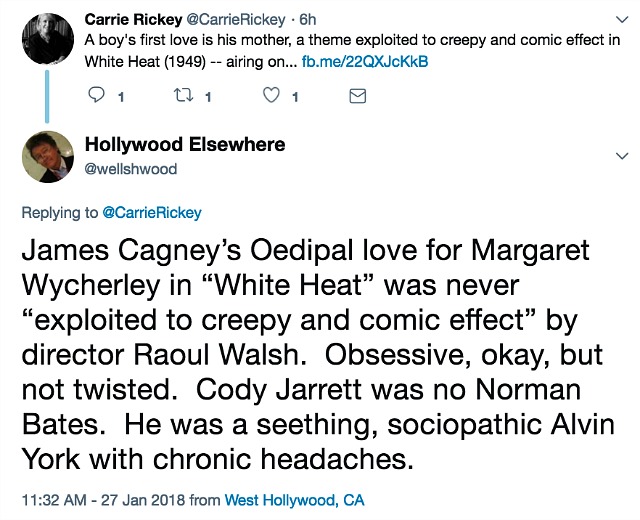
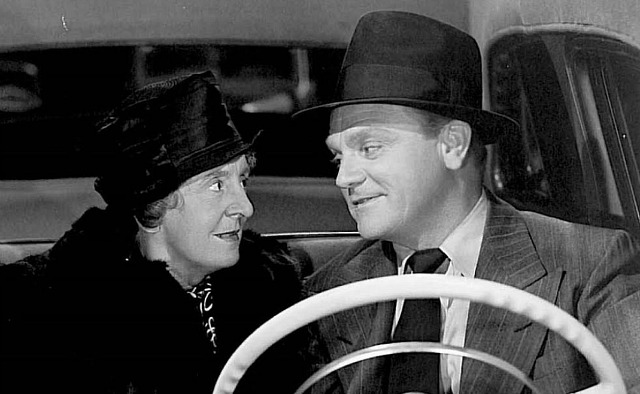
On 3.5.14 Deadline‘s Michael Fleming reported that Steven Spielberg was pondering a remake of West Side Story for 20th Century Fox. Two days ago a West Side Story casting notice was posted on Twitter by casting director Cindy Tolan, announcing that Spielberg and screenwriter Tony Kushner were the principals, and that they’re looking for Caucasian actors to audition for Tony (i.e., Richard Beymer‘s part in the 1961 Robert Wise big-screen version) and Latino actors to play Maria, Anita and Bernardo (played by Natalie Wood, Rita Moreno and George Chakiris way back when).
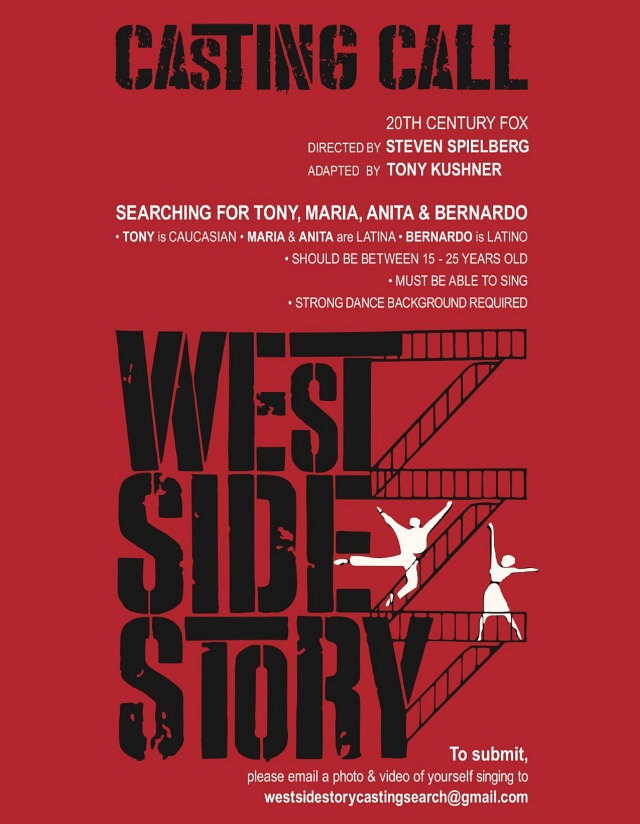
Remaking West Side Story for the screen is a bad enough idea on its own. It would have zero connection to any aspect of today’s culture, for one thing. There’s certainly no trace of gang culture in 2018 Manhattan. Maybe the angle behind the Spielberg-Kushner version is to shoot it in period (i.e., sometime in the early to mid ’50s)? If so that could work. But will Kushner dispense with phrases like “play it cool, daddy-o”? Some of the dialogue in the ’61 film made horses choke even back then.
Who except boomers and older GenXers would be interested in a reboot of (take your pick) the original 1957 stage musical or the ’61 screen version? In the case of those who were teenagers in the mid ’90s and are now pushing 40, who’s clamoring for a Stephen Sondheim-Leonard Bernstein musical version of Baz Luhrman‘s Romeo + Juliet (’96)?
True, Wise’s ’61 version seems stiff and inorganic and overly theatrical by today’s standards. The challenge, I suppose, would be to make a version that feels more “street” and set it against a real-life culture where gang warfare, turf battles and racial animosity are (or more precisely were) regular facts of life.
But this kind of thing seems way out of Spielberg’s wheelhouse. What does a suburban Jewish kid from Arizona know about mid 20th Century gang culture anyway? Of all the directors in all the world who could possibly pull this off, Spielberg would have to be at the bottom of the list. Helming a new West Side Story would arouse every treacly, gooey, sentimental impulse in his system.
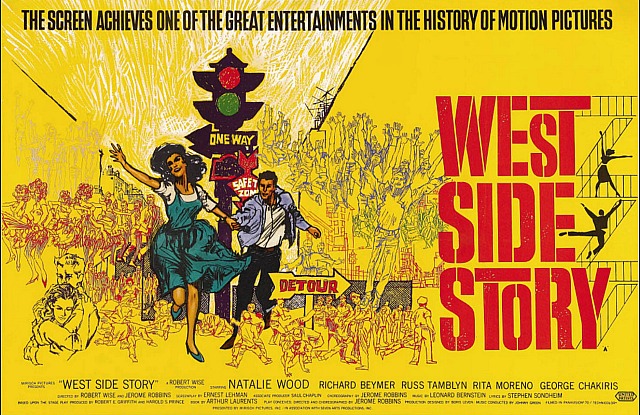
Hollywood Elsewhere just landed at Burbank’s Bob “Join The Peace Corps” Hope Airport. And speaking of Mike Figgis’s landmark 1995 film, I’m wondering why I’ve never watched it on DVD or streaming. Haven’t seen it since ’95, and it’s brilliant. Arguably Nic Cage‘s greatest-ever performance. Okay, this weekend for sure.
A day or so ago a Care2 online petition about Kobe Bryant’s animated short film, Dear Basketball, which has been Oscar-nominated, began collecting signatures. The petition demands that the Academy of Motion Picture Arts and Sciences “rescind” the nomination for Dear Basketball because of the 2003 sexual assault case in which Bryant was accused of rape.
Dear Basketball was written and narrated by Bryant. The director is Glen Keane; the producer is Gennie Rim.
Boilerplate: “On 9.1.04 Eagle County District Judge Terry Ruckriegle dismissed the charges against Bryant, after prosecutors spent more than $200,000 preparing for trial, because his accuser informed them that she was unwilling to testify. Bryant subsequently admitted to an adulterous sexual encounter with his accuser, and then paid her off following a civil lawsuit.” Or something like that.
The signature count is now 15,807, but why does Care2 have a goal of 16,000 signatures? Why not 15,000 or 20,000 or 25,000? Just asking.
Jason Reitman and Diablo Cody‘s Tully (Focus, 4.20) is more of a potential awards-bait vehicle for Charlize Theron than a Reitman comeback thing, which is what I was sensing after catching the trailer a couple of weeks ago.
Tully is a better film than Reitman’s disastrously received Labor Day and Men, Women & Children, so it’s an image-burnisher to some degree. But it’s on the slight side.
Cody’s script is amusingly sharp and sardonic, and Theron’s portrayal of Marlo, a stressed suburban mom coping with pregnancy and child care, is her boldest since playing an alcoholic writer in Reitman and Cody’s Young Adult (’11) and her most Raging Bull-ish performance since Monster (’03), lumbering around Tully with her Aileen Wournos bod.
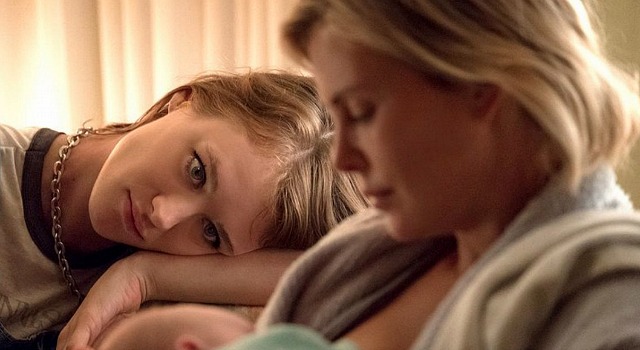
I don’t know if Academy members will be cherishing Tully ten or eleven months from now, but Theron’s performance is angry, open-hearted, prickly, lived-in — an obvious awards-level thing.
Tully is partly a family-unit sitcom and partly a tricky psychological drama. It mostly takes place in a New York-area suburban home occupied by Marlo, her husband Drew (Ron Livingston) and their three kids — a special-needs six year-old boy, a slightly younger girl and a just-born infant.
It’s one of those stories that (a) portrays a problem and then (b) introduces an outsider who not only makes things better but becomes a kind of magic healer. The question is how this agreeable situation will pan out in the long run.
With Drew barely paying attention to the kid-rearing situation, focusing on his job during the day and playing video games at night, pregnant Marlo is exhausted — whipped — by maternal responsibilities. And then the baby arrives and the burden is even more crushing with middle-of-the-night feedings and wailings and whatnot. So Marlo’s rich brother (Mark Duplass) tries to persuade her to accept the gratis services of a night nanny — a younger woman who will drop by in the evening and take care of the baby so that Marlo can get some much-needed shut-eye.
The headline “Trump booed at Davos” got my blood up. Then I watched the clip. At the 22-second mark Trump says, “It wasn’t until I became a politician that I realized how nasty, how mean, how vicious and how fake the press can be…as the cameras start going off in the back.” Then he’s mildly booed for three seconds — 33, 34, 35. But in a chickenshit, half-assed way. If you’re going to boo somebody, do it like a man…”Boooo!” Throw in some hisses and maybe a “bullshit” for good measure.
Three days ago Newsweek reported that Common Cause has filed a complaint about the $130K paid to porn star Stormy Daniels (aka Stephanie Clifford) by Donald Trump‘s personal attorney Michael Cohen. The motive was to ensure Daniels’ silence about having had an affair with Trump in 2006.
The complaint alleges that the payment was an illegal campaign contribution or, according to a 1.22 Newsweek story, “an in-kind contribution, which would violate several campaign finance laws.”
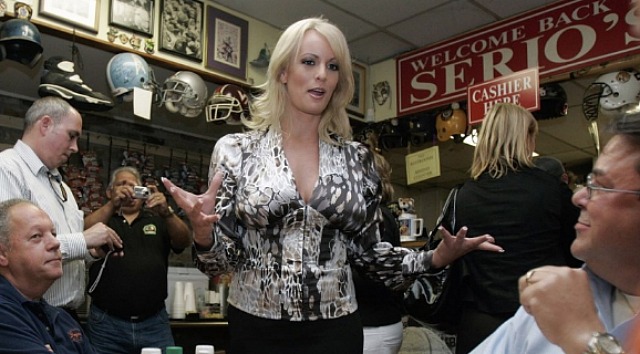
But think about this. Every presidential candidate’s staff has two main purposes — increase his/her chances of being elected and decrease his/her chances of being defeated. Squelching a story about Trump having indulged in a sexual affair with Daniels obviously decreased and increased. How could the $130K be anything other than a legit campaign expense?
Campaign funds weren’t spent for Daniels’ sexual services or some other sundry purpose — they were spent to prevent damaging information getting out about Trump. This is what campaigns do — spin or highlight positive information and obscure or suppress negative information about a candidate.
James Franco‘s un-person status in the Hollywood realm, a result of five allegations of sexual misconduct that broke on 1.11.18, led to his being digitally removed from Vanity Fair‘s special Hollywood issue cover, according to a story by The Hollywood Reporter‘s Chris Gardner.
“According to multiple sources familiar with the shoot, Franco sat for [the] photo shoot and interview and was to be featured in the magazine’s Annie Leibovitz-shot portfolio,” Gardner writes. “He was removed from the cover digitally, however, due to allegations of sexual misconduct that surfaced in the wake of his Golden Globe win for The Disaster Artist.
“Subjects for the Vanity Fair cover are often photographed separately in small groups and combined via digital imaging — Franco’s removal, then, did not require a reshoot. That said, it’s highly unusual for a star to be removed from an elaborate photo layout, especially so close to publication.”
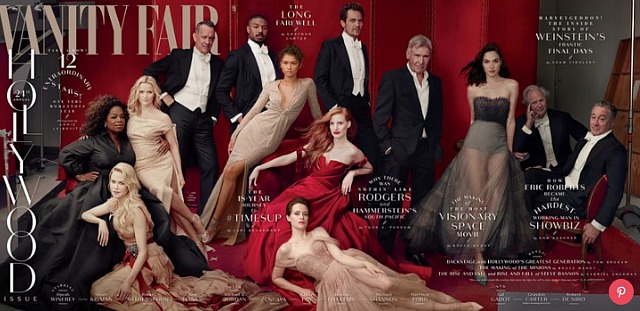
In a 1.25 Sundance Film Festival sum-up, N.Y. Times critic Manohla Dargis acknowledges that the festival “has been widely and rather a little too conclusively declared a disappointment before it was even over.”
I don’t want to assess things in a facile or simplistic way, but I haven’t spoken to a single person in Park City who doesn’t feel that Sundance ’18 has been, at the very least, didactic and a tad underwhelming. Actually, forget the “tad.”
For her own, Dargis thinks the festival has been pretty good if not perfectly fine. She acknowledges that “the tumult of both #MeToo and Black Lives Matter reverberated throughout the festival much as it has throughout the industry.” The “woke” thing doesn’t bother her because Sundance has “been pushing and advocating for filmmakers who are not white men for much of [its] history,” and because it has long been “committed to character-driven tales about lost, besieged, oppressed, searching and triumphant outsiders of one type or another.”
If Dargis truly believes that the aggressively instructive, agenda-driven climate at this year’s festival is no different than the Sundance vibe 10, 15 or 20 years ago, then I don’t know what to say.
I just paid $94 so I can get the hell out of here a day early. If I’d stuck to the original plan of leaving Saturday afternoon I could’ve caught three or four p&i screenings tomorrow, but I’m so sick of this place I can’t stand it any more. I always burn out on festivals after seven or eight days; today is the ninth.
The last big hoo-hah screening — Jason Reitman‘s Tully — happens tonight at 6:30 pm. My Salt Lake City to Burbank flight leaves tomorrow afternoon at 1:55 pm, and good riddance.
At best this was a mezzo-mezzo Sundance. If you ask me it was a fairly weak one.
Lynne Ramsay‘s You Were Never Really Here was the only home run, but it was more of a Cannes replay than a bona fide Sundance film. Ethan Hawke‘s Blaze and Jeremiah Zagar‘s We, The Animals were triples. Jesse Peretz‘s Juliet, Naked, Brad Anderson and Tony Gilroy‘s Beirut, Tamara Jenkins‘ Private Life and Gus Van Sant‘s Don’t Worry, He Won’t Get Far On Foot were doubles. Plus those four conventional docs that I really loved — Studio 54, Hal, Jane Fonda in Five Acts and Robin Williams: Come Inside My Mind.
Sundance festivals can be fun and exciting and all the rest, but the programming this year was so heavily tilted toward the agendas of socially progressive “woke” zombies that my spirit began to wilt and I began to dream about the joys of edging away from this goose-stepping community and embracing contrarianism for the sake of my own sanity and independence.
I’ll be missing two or three films that I really wanted to see (Hereditary, Madeleine’s Madeleine, Assassination Nation), but if they’re any good they’ll find some form of distribution and will screen down the road. Maybe some of them aren’t good enough. I can tell you this much: I just don’t care any more.
The general presumption these days is that if a movie is starring Nic Cage, it’s going to be egregiously B-level — over-the-top scuzzy, low-rent creepy or just bad. Cage plays guys who are so oozy, self-tormenting and over-the-waterfall nuts that they have no road back to sanity. He’s not allowed to play mild-mannered or relatively sane any more. For Cage has more or less become a 21st Century version of Vincent Price. What was the last time that Price portrayed a half-reasonable character? Baca the master builder in The Ten Commandments? Once he began making those horror films for Roger Corman in the early ’60s, his bed was made. Incidentally: The director of this motley motel melodrama is Tim Hunter. I remember Hunter’s River’s Edge. I will always remember that film.